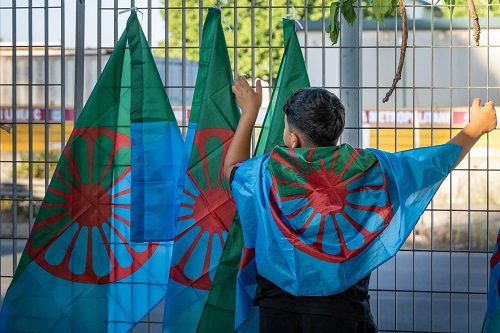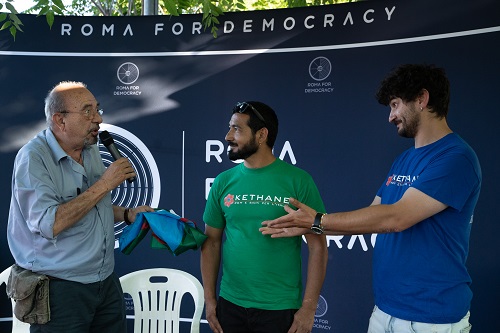European elections, debates with the candidates in Roma camps in Italy for the first time
ROME – They too are Italian: of Roma or Sinti origin, it doesn’t matter. They are Italian and they want to be considered as such. And also “to be considered as a resource, not as a problem”: this is what the representatives of the Kethane Roma and Sinti Movement for Italy and the Roma for Democracy association are asking of the next European Parliament, through a series of electoral stands within the Roma camps, a series of meetings with the candidates for the European elections on 8 and 9 June: the aim is to bring the aspiring MEPs into dialogue with the residents of the camps, answering their questions and listening to their proposals. It had never happened before.
“It’s the first time something like this has happened – wrote Dijana Pavlovic, spokesperson for the Kethane Roma and Sinti Movement for Italy, in a post on the Movement’s Facebook page – . There are 6 million of us across the European Union, of which 2 million are children. Basically a small country, like Denmark. In such a delicate historical phase, Europe should not allow itself to discard such an important number of people”.
The first meeting with candidates took place on May 23rd in Rome, in the “via dei Gordiani” camp, with: Vauro Senesi, famous designer and writer, leading candidate of Pace Terra Dignità (Peace Earth Dignity); Christian Raimo, teacher and writer, candidate of the Alleanza Verdi Sinistra (a green-left party); Marco Tarquinio, former director of Avvenire, today on the list with PD (the Democratic Party): these are the candidates who accepted the invitation which was addressed to all political parties (in the pic below, Vauro Senesi with some exponents of the Kethane Movement / photo Marco Mastrandrea | Kethane).
“About fifty people participated, many young people. Work was among the topics most addressed by the public, especially women. They are worried because their children cannot find work and many camp inhabitants often have to hide their place of residence, otherwise they will not be hired. They suffer episodes of racism even just by entering a bar or a supermarket. They, on the other hand, are just eager to lead a normal life” Dijana told to AGI, an Italian press agency. The latest episode, as reported by the same association, occurred precisely on the occasion of the electoral grandstand a few days ago, which had to take place without the gazebo because the renting company refused to deliver it because the event took place, in fact, inside a Roma camp. Episodes which, however, do not stop the community from seeking its own space in society. A society where the Roma people have long been considered “those who steal”: but things have changed a lot, in the last years, in these communities, and the new generations want to escape from that forced isolation, freeing themselves from that hateful “label”. And they want to work, make their contribution, propose their ideas.
“We often talk about the discrimination we suffer, which is real and tangible, but we tried to focus on another perspective. Our request to Europe is to consider ourselves an investment and an economic, as well as social, resource” are Dijana’s words.
During the event, moderated by Adela Militaru, director of Roma for Democracy, the manifesto for the transnational network of the Roma Foundation for Europe was presented, with the proposals of the Roma and Sinti community to contribute to the economic and social growth of the ‘Union. “We have concrete requests, for example incentives for work, for lifelong learning and for entrepreneurs who employ Roma. This is our European proposal. In this turbulent moment, the European Union requires the contribution of all its European citizens, which Roma and Sinti are ready to give” Dijana further explained to AGI. The community, in fact, demands the participation of its Roma and Sinti voters in the democratic process, because “the European Union today more than ever cannot afford to neglect the potential of its excluded citizens and its marginalized minorities”.
“The Roma and Sinti minority has suffered and continues to suffer racial segregation in housing and schools in almost all European countries – specifies the movement in a note – . To give an example: 1 in 3 of European Roma citizens live without accessible drinking water and without a bathroom at home. Faced with this picture, the policies practiced by the EU so far have not only been insufficient, but for the most part completely ineffective because it thinks with a welfarist and supremacist approach”.
The next appointment is in Milan, on Wednesday 29 May, in the “via di Chiesa Rossa” camp, with Cecilia Strada, leader of the Democratic Party (she’s the daughter of Gino Strada, surgeons and founder of the humanitarian association “Emergency”, recently passed away) and Jessica Todaro Bellinati, Sinti candidate of the Alleanza Verdi Sinistra.
“The forecasts for the next European Parliament are not rosy, the composition is moving far to the right. However, we expect some parliamentarians and parties with whom we talk that, once elected, they will start a working table or, in any case, commit themselves in such a way as to suffer the policies of the European Union towards us” is the final hope of Dijana.
“Love for our country motivates us: accept us as citizens”
ROME – “For years our communities have been exposed to campaigns of prejudice and discrimination which in recent times have found support and justification in a policy which has taken the bulldozer as a symbol, eviction as a practice. This campaign, not sufficiently countered by the institutions and supported by part of the media, causes a profound hatred towards us…”: this is how the presentation of the Kethane Movement begins on the website www.kethane.org where it is possible to find informations on the association that unites the Roma and Sinti of Italy.
“Despite the barriers of discrimination, rejection and humiliation, or perhaps precisely for this reason, in recent years – we read again on the site – a generation has grown up that feels the need to fight the evil that affects us and that is aware that this struggle does not only belong to Roma and Sinti who feel and are part of this country, but belongs to all Italians who believe in the principles of the Constitutional Charter which binds us in a pact of solidarity, of equality in rights and duties and of protection of the weakest as an essential basis of democracy, a pact to be renewed to face and overcome confusion in the face of new and global phenomena that push us to close ourselves in and build walls instead of building bridges need for unity of our diversity, for awareness of ourselves to overcome the feeling of inferiority, for affirmation of our dignity, for participation in the life of our country on an equal basis, for having the right to a normal life. We think of ourselves as a tool to give voice to our communities and express our problems and our expectations. We are motivated by love for our people, we are motivated by love for our country and the right request that our country accept us as its citizens”.
Photos: Marco Mastrandrea | Kethane





